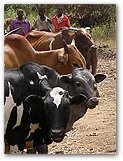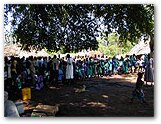Resources
Disease Background
The following information gives a background to the 8 neglected zoonoses targeted by the ICONZ project.
- Tackling neglected zoonoses
-
Basic Facts about the 8 neglected zoonoses:
- Anthrax
- Bovine Tuberculosis
- Brucellosis
- and
- Cysticercosis / Neurocysticercosis / Taeniasis Complex
- Echinococcosis
- Leishmaniasis
- Rabies
- Zoonotic Trypanosomiasis
The Neglected Zoonoses Research Projects Database constructed by ICONZ Work Package 2 can be found at:
http://www.zoonosis.ac.uk/iconz
The objective of this database is to obtain a clear picture of the current world wide research into the diagnosis, burdens and control of eight neglected zoonoses.
The collected information will be used to identify significant research gaps. Research funders will have access to the outputs from this work and will be able to use this evidence to target research and development funds to the areas of greatest need. Others working on the neglected zoonoses will find the information of use in supporting and developing their work.
Collections that are free for most African Researchers (or to researchers from Low Income Countries):
http://www.inasp.info/peri.html
The International Network for the Availability of Scientific Publications (INASP), runs the PERii programme, which offers free access to large amounts of academic literature from all over the world. Click on their drop down list on the right hand side of their website for your country to see what they can offer to you.
http://www.aginternetwork.org/en/
Access to Global Online Research in Agriculture (AGORA) – free or reduced-cost international agricultural journal online access for selected countries via institutions. Check the website to see if your country is eligible, and if it is, ask your librarian to sign up.
http://www.who.int/hinari/en/
HINARI works in the same way as AGORA above, but it relates to Public Health in content.
http://www.oaresciences.org/en/
Online Access to Research in the Environment – again, refer to AGORA above for information. Check the website to see if your country is eligible, and if it is, ask your librarian to sign up.
http://www.africaeducation.org/adl/Default.htm
The African Digital Library (ADL) is a collection of electronic books (eBooks) that can be accessed and used free-of-charge by anyone living on the African continent.
http://www.aluka.org/
A collection of data from around the world on or relating to Africa. Access is free via African institutions, so speak to your university librarian about signing up.
http://www.jstor.org/page/info/participate/new/fees/africanAccess.jsp
JSTOR African Access Initiative allows free access to the full online journal archive of nearly 1000 titles from all disciplines to any academic or not for profit institution on the continent of Africa.
Collections that are free to all users:
http://www.doaj.org/
The Directory of Open Access Journals (DOAJ) is a collection of over 5,000 free, full-text, quality-controlled scientific and scholarly journals from all over the world. Over a quarter of these are searchable at article level.
http://www.bioline.org.br/
A non-profit journal aggregator of Open Access (free full text) biomedical journals containing research from developing countries.
http://www.biomedcentral.com/home/
BioMed Central is a publishing initiative committed to providing immediate open access to peer-reviewed biomedical research.
http://www.scienceinafrica.co.za/
Science in Africa – Africa’s first online science magazine.
http://www.columbia.edu/cu/lweb/indiv/africa/ejournals.html
Free electronic newspapers and journals on and from Africa.
http://www.africapeace.org/ and http://www.africaworkinggroup.org/
The African Peace and Conflict Network publishes open access material including topical analyses, reports, and research findings related to peace-building in Africa.
http://madarevues.recherches.gov.mg
A list of Madagascan published journals including archives, conference reports, theses and other papers.
http://amedeo.com
AMEDEO has been created to serve the needs of healthcare professionals. Core components include weekly emails with bibliographic lists and an overview of the medical literature published in relevant journals over the past 12 to 24 months. All these new information resources are free of charge. Also see http://www.freemedicaljournals.com/
http://www.opendoar.org/
Open Doar: Directory of Open Access Repositories – DOAR is an authoritative directory of academic open access repositories
http://www.plos.org/
Public Library of Science (PLoS) is a nonprofit organization of scientists and physicians committed to making the world’s scientific and medical literature a freely available public resource
http://www.scielo.org/php/index.php?lang=en
SciELO – Scientific Electronic Library Online is a model for cooperative electronic publishing of scientific journals on the Internet. Especially conceived to meet the scientific communication needs of developing countries, particularly Latin America and the Caribbean countries
http://www.researchgate.net
ResearchGATE is a free of charge, online research platform with meta-data of around 35 million articles and publications and tens of thousands of full-texts available, focused on the sciences but open to all disciplines. ResearchGATE also acts as a social networking platform where information on jobs, conferences and new publications can be shared between individuals and groups.
Steps Towards Integrated Control: Neglected Zoonoses Scenarios
Case scenarios illustrating steps towards integrated control of neglected zoonoses that are already underway, giving an insight into the approaches and benefits envisaged for ICONZ:
- Going global: estimating rabies under-reporting in Africa and Asia
- From PCR to policy: new ways of controlling zoonotic sleeping sickness
- Bringing vets and medics together to deal with bovine TB in the United Republic of Tanzania
- Engaging stakeholders: creating networks to combat cysticercosis
- Adopting effective surveillance and control templates for anthrax
- Combating a hidden threat: cystic echinococcosis in Morocco
© WHO, with kind permission F. Meslin, source document:
http://www.who.int/zoonoses/Report_Sept06.pdf
Integrated Control of neglected Zoonotic diseases in Africa (2007)
http://whqlibdoc.who.int/hq/2008/WHO_HTM_NTD_NZD_2008.1_eng.pdf
Overarching aspects:
- Socioeconomic and Institutional Aspects
- Messaging, Cultural Aspects and Traditional Knowledge


Click the thumbnail image to view the full-sized photograph.